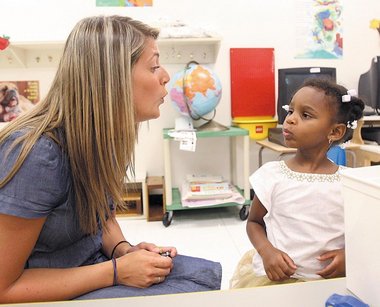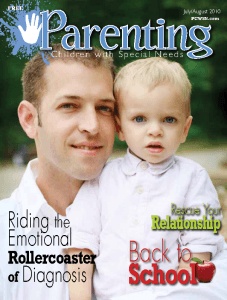The following post was graciously shared with Minds on Music from Studio3Music. We all agree: it’s what Kindermusik is all about!
This arrived in my inbox the other day from one of our Kindermusik moms, Melissa. I read it, and by the middle of the email, I had tears streaming down my face. I have never had a story about one of our Kindermusik children touch me quite as much as Luke’s. Enjoy!
My child is special. Yes, I know what you’re thinking, ‘your child is special too’, but my child is REALLY special. Luke is a special needs child. In short, he was born with brain damage. He has developmental, fine and gross motor, and significant speech delays. One thing that Luke is not delayed in is his love for music!
We started Kindermusik with Luke when he was 2. As we sang during Luke’s first class his teacher, Beth, explained how holding the different sized egg shakers encouraged different motor skills. I felt a pang of emotion shoot like lightening through me. “This is perfect for Luke”.
We played with items with different textures, something Luke’s physical therapist had suggested just weeks earlier. We drove cars on different body parts, played games, and of course sang and danced! I knew right away that Kindermusik going to be great for Luke.
After that first class I buckled Luke in his car seat, drove about a quarter of a mile down the road and began to sob. I was (and am) SO thankful that Luke has this opportunity to nourish and support him in such a fun way. I immediately turned my car around and went back to the Kindermusik class.
Miss Beth saw my tear stained eyes and gave me a big hug before I could even share anything with her. Once I found some composure I briefly shared Luke’s condition with Beth and told her what her class means to us. Here she is, just doing her job, like so many other Kindermusik teachers but she is actually helping to HEAL my child…and expand yours!
For most of Luke’s first round of Kindermusik he was typically just along for the ride. He didn’t have the fine motor skills to play many of the instruments, his sensory issues made it difficult for him to transition from playing to being held quietly during cuddle time, he doesn’t have the ability to talk so singing along was out, he didn’t make any sounds at all for that matter, also, he couldn’t sit still for story or rolling a ball back and forth, and he didn’t mimic so he wasn’t quite developing thru watching either. I pretty much held his hands, literally, throughout every exercise and activity, manually supporting his hands and fingers in participation.
Despite all this, Luke LOVED Kindermusik. He began to get excited when we’d pull into the parking lot for Kindermusik, squealing, smiling, and kicking his legs in excitement! Then one day, as we left class I put Luke in his car seat. I sat my keys in his lap while I buckled him in and he took my keys, put them between his legs, and put his arms up and out to his sides. Luke was mimicking! Luke was trying to play! Luke was thinking in his sweet little brain:
“Jingle, jingle, jingle, go the car keys.
Jingle, jingle, jingle, go the keys.
Lost them, lost them, where are the car keys?”
I couldn’t wait to tell Miss Beth…and everyone else for that matter!
Luke is now three and in his second week of his second round of Kindermusik. Now Luke zips around the room yipping and squealing. He had class this morning and did 6, count them 6, new things in those precious 45 minutes.
First, Luke attempted hammering his rhythm sticks! He switched his grip around until he was able to hit the top of one stick with the other like he was hammering in a nail. No hand-over-hand, he just did it! He knew he did it too! He made sure I saw him and I could see the pride in his smile. I felt that lightening bolt of emotion shoot through me again.
Next, he noticed that I had put the top of the tone bar back on upside down. Noticing this is huge. Next, he tried to problem solve by turning the bar over. Of course his logic was flawed, but for a little boy without a frontal lobe, attempting to problem solve is huge!
NEXT, Luke allowed me to hold, embrace, and rock him during the cuddle part of class! I think he even enjoyed it! After this we played with balls. Luke still couldn’t sit still or roll the ball but he did something unexpected, he caught the ball, a few times!!! I’ve never seen him do this before and, since he has an older brother, balls are big things in our house!
Also during ball time, he saw a classmate sitting on her ball and bouncing on it…what did Luke do? He mimicked! He put that ball under his little tush and tried to sit on it! He couldn’t balance well enough to do it but he tried…I almost cried!
Lastly, when class was over, Luke “eagerly awaited” his hand stamp. His version of eager waiting is standing up an inch from where I’m sitting and pointing with a limp wrist at Miss Beth stamping the other kids. I escorted him up front and he got his stamp. That’s not new, what is new is what happened next: he pulled up his shirt up, along with the sensory leotard top he wears, stuck out his belly, and gently patted his stomach. HE wanted to have his tummy stamped like some of the other kids and, in his own way, he TOLD me this! Talk about leaps and bounds!
Another thing we’ve noticed since starting Kindermusik is that if Luke is “playing” a musical instrument with his hands he may, on rare occasion, vocalize. In a sweet, soft, broken, purposeful whisper we’ve heard him sing: “ahhhhhhh”, “oooooooooh”, and “ooouuuuuuu”. He is always the first to notice that music is playing: in the car, at the mall, on a commercial, anywhere. He is drawn to it.
If Kindermusik can have such an impact on my special needs child, just imagine what it is doing for your child!
If you ever get the chance to meet Luke you will know immediately that he’s special. You may not even notice that he is handicapped because you’ll be so mesmerized by his hugely gregarious smile and his eyes shooting darts of love at you more accurately than one of Cupid’s arrow.
-posted by Melissa, Momma to Luke, who says that there is indeed something special about Luke, and her family is SO thankful that he has the musical therapy of Kindermusik harmonizing with them to help heal him.
Special thanks to Studio 3 Music for allowing us to share this great post from the Studio 3 Music blog. Studio 3 Music in Seattle, Washington, the world’s largest Kindermusik program.




